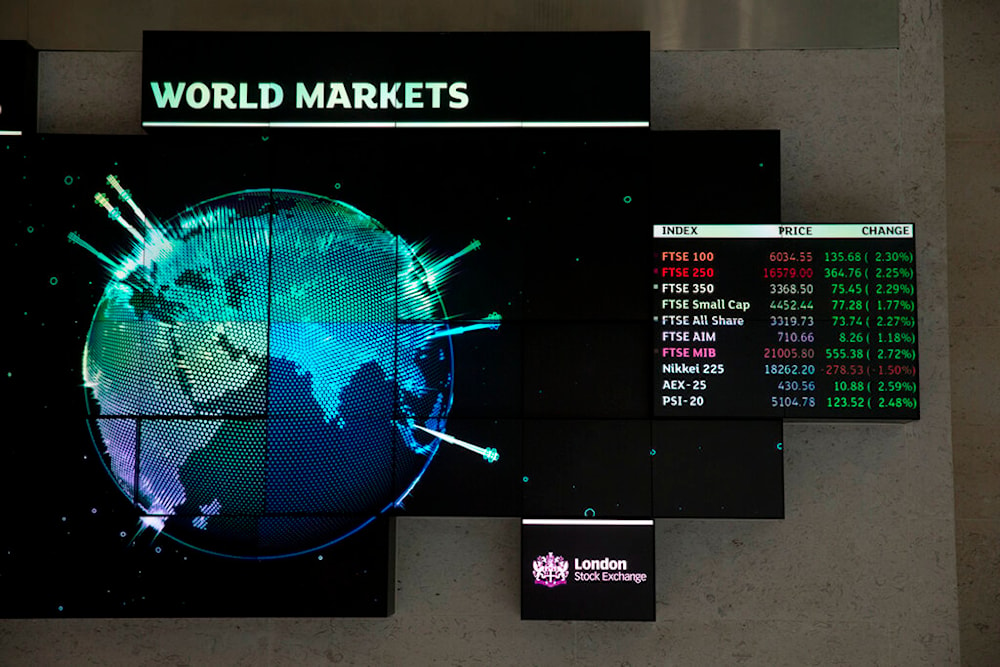Global deal-making drops below $3tn for the first time in a decade
As 2023 concludes, global deal-making was revealed to have reached its lowest in a decade, after geopolitical conflicts and interest rates took a toll on global finances.
-

Financial market information is displayed inside the London Stock Exchange in the City of London, Tuesday, August 25, 2015. (AP)
As 2023 concludes, global deal-making was revealed to have reached its lowest in a decade, after geopolitical conflicts and interest rates took a toll on global finances, according to the Financial Times.
Almost $2.9 trillion were globally frozen this year, making it the first time in 10 years that deal-making dropped below $3 trillion. According to the London Stock Exchange Group, this signifies a 17% drop from the year before, making it the first time deal values show more than a 10% negativity across two consecutive years since the Great Depression.
In Europe, deals saw the mightiest decline of 28% in deal value, followed by the Asia Pacific region with a serious 25%. The US, however, recorded the lowest decline at just 6%.
Dealmakers have been facing multifaceted challenges throughout the year, ranging from post-pandemic downturns of mergers and acquisitions, and the surge in interest rates, both of which prompted regulatory bodies to take more vigorous approaches.
A sharp increase in global value would have been recorded with ExxonMobil and Chevron striking more than $100 billion deals collectively during the last quarter of the year, stimulating a 28% increase from the quarter before. However, the Israeli war on Gaza obstructed the resurgence.
In a statement commenting on the matter, the co-head of Global M&A at Goldman Sachs, Mike Sorrell, said “The regulatory environment has been tricky through the year. As sentiment was improving, you had the Middle East happen.”
Growth may be witnessed in second half next year
Financial sponsor deals decreased by 30% in the last year, totaling $562 billion. Advisors noted that private equity firms faced challenges in leveling asset valuations. Dealmakers anticipate increased pressure on private equity groups to finalize transactions in the coming year following an extended period of reduced activity.
JPMorgan’s co-head of Europe, Middle East, and Africa M&A, Carsten Woehrn, said: “The successful exits [this year] were by the most courageous sellers with the best assets, and every process was more structured and complex. For next year what’s clear is that there is both a willingness and a need to do deals by sponsors."
Furthermore, stricter restraints on competition have been established, leading to failures in projects such as Adobe’s $20bn takeover of software group Figma, which was the focus of EU and UK watchdogs. However, other projects were able to see the finish line, after being given a run for their money, like Microsoft's 75 billion dollar deal for gaming company Activision Blizzard, which took almost 2 years to close.
The general financial environment hurt global investments, decreasing fees by 8% from the year before. Mergers and acquisitions, on the other hand, sank by the steepest low of 26%, since 2016.
Advisors admit that growth may be witnessed in the second half of the upcoming fiscal year, rather than the start.
UN chief warns of fragmentation in global finance system
During the last quarter of the year, UN Secretary-General Antonio Guterres, during a summit involving Southeast Asia's ASEAN bloc, China, the US, and other nations in Indonesia, warned that the global economic and financial systems are at risk of a significant fracture.
In his comprehensive address covering topics like geopolitical tensions, multilateral development finance, and climate change, Guterres urged world leaders to seek peaceful and inclusive resolutions for the world's pressing challenges.
"There is a real risk of fragmentation – of a great fracture in world economic and financial systems; with diverging strategies on technology and artificial intelligence and conflicting security frameworks," he said.
He advocated for the establishment of a mechanism aimed at offering assistance to financially burdened developing nations. This assistance would encompass measures such as debt payment suspensions, extended lending terms, and reduced interest rates.
Additionally, he expressed his backing for reallocating an extra $100 billion from the International Monetary Fund's Special Drawing Rights via multilateral development banks. This reallocation is intended to bolster liquidity and cater to the requirements of developing economies.

 4 Min Read
4 Min Read








